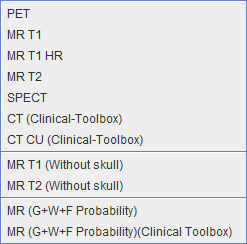The normalization templates serve as the reference images for the elastic deformation algorithm. They usually represent the standard anatomy imaged with a certain modality. Currently the following brain templates for different modalities are available via the shortcut  :
:

PET |
PET template provided with SPM5 (Statistical Parametric Mapping). It was constructed by Friston et al. at the Wellcome Department of Cognitive Neurology (University College London, UK) using Oxygen-15 water PET images of 12 normal subjects scanned in resting condition with eyes closed. The template is in MNI (Montreal Neurological Institute) coordinates. |
MR T1 |
T1 template provided with SPM5. The image was derived from the ICBM152 image which represents the average of 152 healthy T1 brain images by reducing it to 2mm isotropic resolution and smoothing with an 8mm FWHM Gaussian filter. The original ICBM152 data originates from Alan Evans, MNI, Canada (ICBM, NIH P-20 project, Principal Investigator John Mazziotta). |
MR T1 HR |
|
MR T2 |
The same as the T1 above, but with the T2 MR images. |
SPECT |
T1 template provided with SPM5. It was created by Leighton Barnden et al from the Department of Nuclear Medicine at the Queen Elizabeth Hospital in Adelaide 22 normal female subjects. Each was scanned after injection of Tc-99m HMPAO on a triple head camera with ultra-high resolution fanbeam collimators. |
CT |
CT template for older population created from 30 healthy individuals with ages similar to what is commonly seen in stroke (mean 65 years). Developed for the SPM8 Clinical Toolbox by Rorden et al [10]. |
CT CU |
CT template as above but with the converted units (CU) which improves the contrast for soft tissue and CSF so that the normalization procedure works better. Conversion procedure : HU values -1000..-100 are mapped to 0..900, values from -99..100 are linearly scaled to the range 911...3100, and values i>100 become [i+3000] [10]. CT images to be normalized with this template must also be converted with the same procedure. |
MR T1 |
As the T1 above, but with the skull part of the image removed. |
MR T2 |
As the T2 above, but with the skull part of the image removed. |